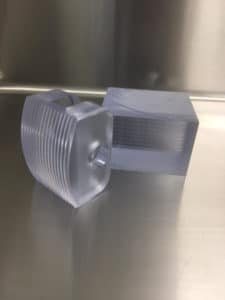CNC stands for Computer Numerical Control, the concept of controlling machine tools with a computer. It rose to prominence in the 1950’s, largely because it empowered machine shops to boost their productivity vastly, since the operator no longer had to pay constant attention to the machine. What’s more, CNC has made it possible to machine highly complex shapes and parts at much closer tolerances.
CNC milling, the topic of this blog, is one form of CNC plastic machining. Other forms include CNC routing, CNC turning and CNC sawing. As experts in all four, we’re happy to share some expertise about CNC milling: what it is, what it’s used for, and some extra steps to yield surface finishes as smooth as 15Ra.
What is CNC milling?
Similar in appearance to a drill press, a milling machine uses a cutting tool that moves in all three dimensions, cutting away material as it makes contact. The cutting tool can be square, rounded or angled for a variety of shapes.
Usually, the cutting tool rotates around an axis perpendicular to the table holding the block of material being cut. The computer controls both the motion of the cutter and the motion of the block, and can turn the block to face many different orientations—even in the middle of the process—to allow for even more complex geometries.
CNC milling can be used with most rigid materials, including metal, but we specialize in milling thermosets and thermoplastics, polymers and advanced engineering materials. While other forms of CNC machining can be used for these materials as well, CNC milling is distinct in the geometries and surface textures it can render. We can advise on the best process to use for the part and material you have in mind.
What is CNC milling used for?
The CNC milling process is used to create advanced parts from all types of plastic, including but not limited to ABS, PVC, polypropylene, Lexan, Nylon and many more. Manufactured parts go toward a range of applications in many industries, commonly sanitation & water treatment, food & beverage processing, check valves & fittings and beyond. Clientele ranges from private companies to government agencies producing quantities in the tens of thousands.
What extra steps are needed?
We perform secondary post-milling operations to save you time and lower your production costs. For example, we can finish through-bores, add threads, mount surfaces and brand parts with hot stamping or silk screening. In addition, we can machine any metal parts your design may require.
Lastly, we complete parts with a superior finish to meet your specifications, such as a level of optical quality or a post-production polish. We also demand parts pass a rigorous ISO 9001:2008 certified quality inspection before shipping them to you. Thanks to our state-of-the-art machinery and experienced technicians, our parts hold tolerances of +/- .001.
See more about our specialties in CNC milling.
Why partner with Reading Plastic for your custom plastic parts? We’ve been in the industry for decades, can meet all compliance standards and have a reputation for quality, precision and efficiency.
Request your quote today!